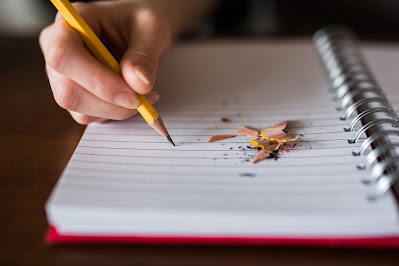My son used to bring home written work and had been starting on grammar and writing sentences. He balks at writing any word for me. He is left-handed so I researched this and it may be that his hand hurts when he writes. I would love to know any tidbits of help you may have also for what Montessori language materials to start with.
There are three routes you can try. One is a program that is popular with homeschoolers who have older children that have issues with writing, called Handwriting Without Tears. The program uses capital letters to start... I have heard great things about it. hwtears.com
The second option is traditional Montessori and that is to start cursive. You would need cursive sandpaper letters (lower and upper case), a green chalkboard that is squared on one side and lined on the other, as well as Montessori paper that is 1) squared, and 2) lined (you can download the paper from Montessori Materials). The chalkboards are not too expensive and most Montessori suppliers carry them.
The third option is to continue with lowercase print but use the above chalkboards and paper for writing practice. There is also a website that sells blackline masters:
If you use them, have the sandpaper sounds/letters to go with them for tracing with your fingers, or something similar. You trace the letter first with two fingers--pointer and middle finger (left hand for your son and you use your left hand, too!) then take a regular size crayon or thin marker or colored pencil and write/trace over the row of "a", etc.
But I'd start with the chalkboard (squares) and numbers (you need sandpaper numbers) and do one number per line, three numbers at a time (per sitting/per day).
Think about the above options, including the Handwriting Without Tears, and let me know which option you might want to go with so I can further help you (depending on what option you choose).
There is a great program (workbook and readers) called Primary Phonics. You can order them from Amazon.com or Learning Things. They are phonics-based. This is a good system to use (it goes up to sixth-grade level) for homeschoolers because it is guided, it takes some of the pressure off of you as to what to do from week to week, and it becomes the workbook that tells your child what to do (and not you!). Check it out at Amazon or LT and let me know what you think. The workbooks are also inexpensive.
As to what Montessori materials to use for language, I'd suggest the green sandpaper sounds (blends), then write them on the green chalkboard in squares, as well as make words with the Movable Alphabet.
You can do two per week. And let's say you are working on the "ch" and the "oy", incorporate those sounds into your everyday activities (chair, toys, chin, soy milk...) for a holistic approach.
I also recommend the following Montessori books for language and reading:
- Montessori Read & Write by L. Lawrence
- Teaching Montessori in the Home: The Pre-school Years by Elizabeth G. Hainstock
- Teaching Montessori in the Home: The School Years by E. G. Hainstock
For writing-practice printables (non-Montessori) try YoungMinds at DonnaYoung.org here.
~Lisa Nolan

